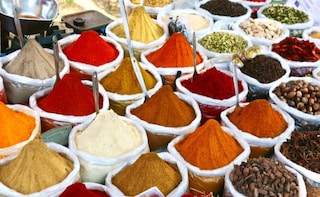India has a variety of spices grown in various parts of the country with different climatic conditions, each offering a distinct flavor and aroma. Indian cooking wouldn't be what it is without the use of all the spices we use in our everyday dishes. In fact, not just food, spices are used for their medicinal benefits in so many home remedies as well. Be it a homemadekadhawhich helps provides relief with a sore throat or a hot glass of milk with a pinch of turmeric and black pepper to relax your body, we cannot deny that spices are an integral part of everyday living.
3. TurmericHaldi ka Dudh (Turmeric Milk) is often considered as golden milk and is very famous in India as a home remedy for cold and flu, and repairing body cells. Turmeric is an antiseptic and anti-inflammatory spice which helps combat cold and cough, especially effective for dry and painful cough.
Coriander seeds contain special volatile oils and fatty acids which help in healing wounds, maintaining healthy tissues and also protecting against common cold and flu during winter months. It also helps protect skin elasticity by production of collagen, and other nutrients such as folic acid, vitamin A, and almost 30% of vitamin C (12).
Advertisement
3. TurmericHaldi ka Dudh (Turmeric Milk) is often considered as golden milk and is very famous in India as a home remedy for cold and flu, and repairing body cells. Turmeric is an antiseptic and anti-inflammatory spice which helps combat cold and cough, especially effective for dry and painful cough.
Advertisement
Coriander seeds contain special volatile oils and fatty acids which help in healing wounds, maintaining healthy tissues and also protecting against common cold and flu during winter months. It also helps protect skin elasticity by production of collagen, and other nutrients such as folic acid, vitamin A, and almost 30% of vitamin C (12).
Advertisement
For the latest food news, health tips and recipes, like us on Facebook or follow us on Twitter and YouTube.
Advertisement
